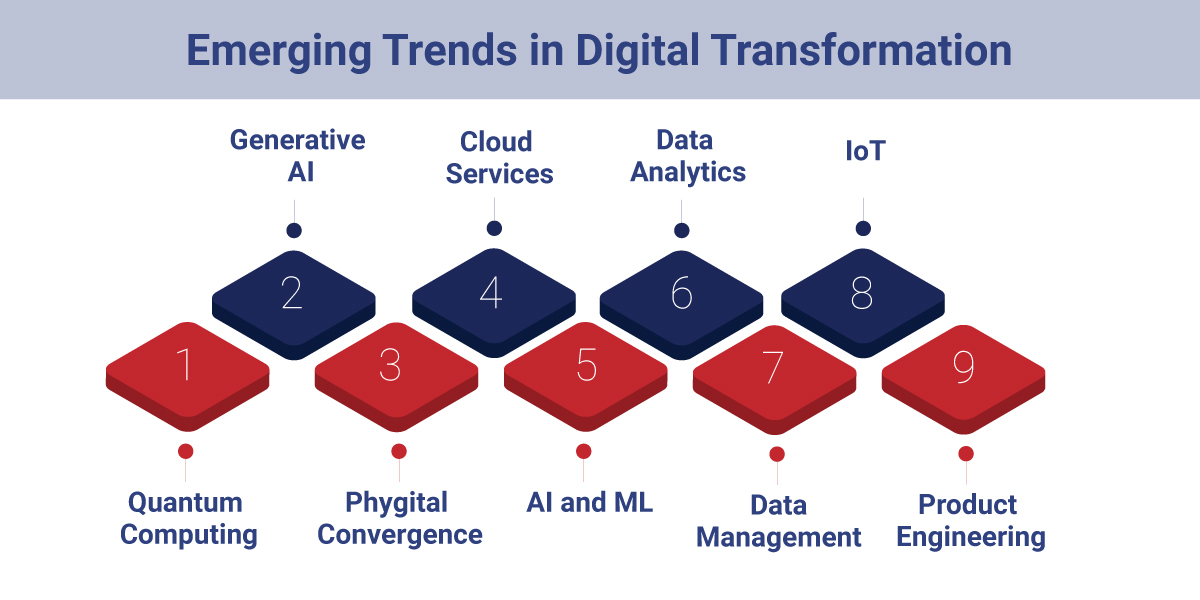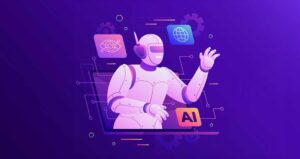As we look ahead to 2025, enterprises continue to invest in digital transformation (DX) initiatives to digitalize how they operate, innovate, and engage with customers. The Digital Transformation Market is expected to grow at a CAGR of 21.32% from 2023 to 2028, reaching USD 4,462.49 billion by 2030[1].
Number of predictions were made for digital transformation trends in 2023 where few of them are correct, and others have barely scratched the surface and will continue to trend for 2024 as well. Let us explore the latest digital transformation trends 2024 to discover how it can help your organization to drive efficiency across your operations, stay competitive and meet the evolving demands of end-users.
Latest Digital Transformation Trends for Enterprises
The digital transformation landscape for enterprises is evolving with new trends shaping businesses modernize their operations. From AI and ML to cloud computing and generative AI, let’s dive deep and explore the latest trends in digital transformation across various industries.

Evolution of Generative AI
In the ever-evolving landscape of Artificial Intelligence, Generative AI has come a long way with its introduction in language translation and simple language models. It allows us to generate new and realistic content like text, images and videos. The popular innovation of ChatGPT and DALL·E by OpenAI is the ideal real-life example of how generative AI is impacting the industries across.
AI powered Large Language Models will continue to excel in generating natural language text, translating languages, creating automated chatbots and crafting creative content. Generative Adversarial Networks (GANs) and Autoencoders will improve, creating more realistic images, videos, and audio.
By 2026, more than 80% of enterprises will have GenAI-enabled applications in production environments, up from less than 5% in 2023[2].
These stats clearly shows that the future of digital transformation will harness generative AI for personalized marketing campaigns, product innovation, and enhanced customer service, leveraging its capabilities to create compelling and tailored content that resonates with their audience.
Cloud Services
The agility, scalability & security cloud services offer make them an inevitable component of digital transformation trends. By 2027[3], more than 50% of enterprises will adopt and implement industry cloud platforms to accelerate their business operations.
Enterprises can leverage the packaged business capabilities of cloud platforms to implement differentiating digital initiatives & accelerate time to value while avoiding lock-in. It would include hosted & managed platforms, applications & data services.
Data Analytics
Businesses across the globe are creating a massive amount of structured, unstructured, and raw data daily. While this data can change the game, storage, processing, and analysis of the same poses a challenge. You would agree data & and analytics go hand in hand. And it helps companies to identify trends, answer questions, map out solutions, and explain the nature of events that happened to draw relevant conclusions finally. It is where big data analytics can make your work easy. It can help process a massive amount of data and extract the correct information for remodeling strategies & making better decisions. You can count on a dedicated data analytics services provider to help you craft an effective digital transformation strategy. It would cover all stages of the journey – from developing a plan to proof of concept to implementation.
90% of corporate strategies have referenced data as a vital business asset & analytics as a critical competency in 2022. (Gartner)
Internet of Things (IoT)
This revolutionary technology promises excellent efficiency across industries. And, IoT-based digital transformation is applied to physical products. While central to both DX and IoT is data, with its proper application, IoT technology can utilize & convert it into useful information for the company. And a dedicated IoT platform enables the digitization of physical products. Data collection also provides a digital link between a company, its products & its customers. IoT enhances customer satisfaction in the retail sector by delivering real-time actionable insights. Within the healthcare sector – telemedicine is prospering with advanced IoT capabilities. The use of IoT in manufacturing makes operations swift, safe & agile. You can partner with a dedicated IoT application development services provider to connect users & devices. They can help with requirement engineering, architecture design and platform & app creation to testing & support for your entire lifecycle of IoT initiatives.
The revenue from the IoT sensors market is expected to rise to roughly 43 billion by 2025. (Statista)
Quantum Computing
In 2024, a significant change in how we use computers is coming. It’s called quantum computing. This new kind of computing is super powerful because it uses quantum bits (qubits). These qubits can do challenging tasks much faster than regular computers. Because of this, quantum computing is set to shake up many industries. For example, it could speed up finding new medicines and better manage money. It can be used in a lot of different areas,
- Drug Discovery and Development
- Materials Science
- Financial Modeling
- Artificial Intelligence and Machine Learning
As businesses and organizations start using quantum computing, they must be ready for the significant shift it brings. They’ll need to understand how quantum computers work and get help from experts. By doing this, they can take full advantage of the fantastic potential quantum computing offers. These recent in trends in digital transformation will lead to essential changes and create new chances for progress in technology and innovation.
Expanding Phygital Convergence
Phygital convergence, the merging of physical and digital experiences, will strengthen its presence in 2024. This trend in digital transformation involves leveraging AR, VR, and IoT to create immersive and interactive experiences.
Augmented reality will overlay digital information onto the physical world, enhancing real-world experiences. Meanwhile, virtual reality will continue to create simulated environments, offering immersive interactions for various purposes. Also, IoT will expand its reach, connecting devices and enabling data collection for a more interconnected world.
Businesses will capitalize on digital convergence to provide innovative and engaging customer experiences, blurring the lines between the physical and digital world.
Artificial Intelligence and Machine Learning
AI and ML are excellent drivers for planning and implementing digital transformation. They help companies develop comprehensive strategies based on real-time market intelligence rather than piecemeal tactics of disjointed systems and processes. With AI and ML, information can be analyzed in real-time. It helps increase responsiveness to changes in customer behavior and events and makes business processes, including IT operations, more efficient. AI uses algorithms to create or adjust programs by taking advantage of the insights gained with ML. At the same time, AI mimics human intelligence to identify and react to behavior and events. ML utilizes big data to analyze & and correlate patterns that offer insights into customer behavior and other events. It provides input for solutions to improve business processes and customer experiences. Further, it can help identify shifts in behavior and events as they happen to devise solutions that can address the decline in sales.
By 2026, organizations that operationalize AI transparency will see their models achieve a 50% improvement in business goals (Gartner)
Data Management
Information is imperative to witness the change that digital transformation depicts. From insight-driven decisions to customer delight to productivity enhancements, it culminates in a single keystone – data management. It comprises data collection, processing & cleansing to unification, integration, and dissemination; data management dramatically influences the speed and scale of digital transformation. An experienced data engineering company can help you unify and navigate data with accurate data integration.
By involving Chief data officers (CDOs) in setting goals and strategies can help increase consistent production of business value by a factor of 2.6X (Gartner)
Product Engineering
To transform digitally, businesses must reinvent their product offerings while modernizing existing legacy systems. It helps in keeping up with evolving business priorities. Adopting product engineering services is the way ahead for companies that want to keep delivering value, even in testing times. Enterprises can either implement software products to enhance employee productivity or monetize them to generate revenue. The power of each of these technologies lies in the way they are leveraged into your company’s digital transformation strategy. Explore how sustainable tech partnerships can enable digital transformation by navigating the associated complexities. So, if you are yet to digitize your business, we know exactly how to make these technologies work in combination so you can drive significant impact.
The global product engineering services market is expected to reach USD 1,979.79 billion by 2029 (Data Bridge Market Research)
Along with these emerging trends, many other digital transformation trends are innovating and reshaping the digital landscape. Like, 5G technology will continue revolutionizing connectivity, enabling faster data transfer. At the same time, cyber resilience and blockchain technology will safeguard organizations against cyber threats across diverse business verticals. So, businesses prioritizing these trends will observe remarkable growth and innovation in the future.
Benefits of Digital Transformation in Different Industries
Digital transformation is important to the success of every modern business. But, if you still need some motivation before taking the plunge, then check out the benefits that it offers across business verticals:
Healthcare
- Enhanced responsiveness with centralized access to patient data
- Reduced infrastructure cost with digitalization trends and tools for health support
- Accurate analysis of health data and patterns for defining personalized treatment plans
- Improved patient experience with easy access to telemedicine technologies
Retail
- Automation of complex, time-consuming & error-prone tasks
- Efficient supply chain management
- Improved enterprise agility and customer buyer journey
- Enhanced responsiveness to customer needs & market trends
- Omnichannel shopping via digital channels
- Improve customer focus with organized internal workflows
- Identification of new value propositions with data intelligence
Read more on digital transformation in Retail
FinTech
- Acquisition of digital investors with online services
- Reduced paperwork with robotic process automation
- Customized offerings with the application of analytics to consumer data
- Use of AI algorithms to upsell & cross-sell services
- Adoption of blockchain technology for increased transparency & reduced risk
Read more on digital transformation in Finance
Manufacturing
- Reduced operational costs with the implementation of the Industrial Internet of Things (IIoT)
- Increased productivity with the use of automation software
- Data-driven risk analysis & decision-making mechanism
- Improved product quality with the implementation of real-time analytics
- Improved CX with a simplified online ordering process
Read more on digital transformation in manufacturing industry
AdTech
- Enhanced targeting and personalization for advertising campaigns.
- Improved data analytics for better insights and decision-making.
- Automated ad serving and optimization for increased efficiency.
- Seamless integration with emerging advertising technologies.
- Greater agility and adaptability to market trends and consumer behaviors.
Edtech
- The reduced administrative burden due to digitalization
- Improved enrollment with a self-service portal
- An immersive learning experience with user-friendly web & mobile apps
- Learning is made possible anytime, anywhere with online classrooms
- Use of technology to track progress and personalize learning
We can help you assess your technology needs and tailor a comprehensive, step-by-step approach. And if you wish to learn more about developing a robust digital transformation framework, then this article is your one-stop resource: How to Transform a Traditional Business to Digital Enterprise Successfully.
How Rishabh Software Can Help You Accelerate Your Digital Transformation Initiative?
At Rishabh Software, our enterprise software development services offer multi-domain expertise to help all the shapes and sizes of organizations to assist you in developing custom applications according to your enterprise needs. We have a proven track record of successfully serving global clients across various sectors.
As a leading digital transformation services provider, our proficient team of certified professionals is equipped to digitally transform their business by modernizing disruptive business solutions. We empower businesses to transform their customer journey and adopt insight-led processes to provide intuitive, high-end experiences.
Let us help you develop a digital strategy and roadmap that aligns with your business goals. From data analytics solutions to cloud application development and mobile app development to IoT application development, our software product engineering services ensures gent-gen solutions to accelerate your digital journey.
Our Digital Transformation Success Stories
These success stories are a few of Rishabh Software’s varied DX initiatives where we’ve helped our clients remain relevant & competitive using the right digital technologies.
- Cloud: For an Australian EdTech company, we deployed a fully responsive cloud-based e-learning platform with seamless support across devices. The upgraded platform has digitized all processes – from administrative functions & communication to attendance monitoring & performance tracking. It resulted in a 2x increase in new registrations, reduced operational costs by 50%, and significantly improved student learning outcomes.
- Real-Time Analytics: A UK-based global DOOH agency turned to us to develop an exchange platform. It integrates an RTB system that allows multiple media owners to bid on ad inventory in real-time. The solution uses a product adapter to fetch & process inventory listings, a trading engine to publish the exchange supply message & an auction stream to send bid requests to the demand-side platform with win/lose notifications. The solution ensured 100% utilization of available ad assets with its capability to process 30 million auctions in under 30 minutes.
- IoT: A leading manufacturer of fluid control systems with building an IoT-based Web Solution. It was integrated with a BI-powered analytics system to generate real-time reports. The solution accurately measures the data related to fluid volume, flow, storage level & more. To ensure fast & accurate reporting, it enables automated validation, sorting & versioning of data. It resulted in a 75% reduction of the time spent on routine processes with 30% more cost savings & 40% rise in sales revenue.
- AI & ML: A prominent UK-based medical service provider develops an ML-based healthcare monitoring system. The ML-based data models enable informed decision-making with accurate recording & real-time analysis of patient health data. This healthcare monitoring system improved the diagnosis rate by 63% with centralized health record management & patient intelligence.
- Data Management: A US-based hospitality giant collaborated with us to create a data warehouse. It acted as a centralized source of actionable insights for stakeholders. We built a Cloud Data Warehouse (DWH) Solution with intuitive dashboards and scalable data reporting capabilities. From analyzing their data, creating an operational data source & ETL routines to using power BI & deploying the warehouse on Azure, we provided end-to-end support. The outcome was a 50% increase in workflow efficiency with a 40% reduction in quality issues.
- Product Engineering: A Middle East-based media company connected with us to develop an anime OTT streaming platform. With our experience in developing VOD applications, we integrated the platform with features like video library management, watchlist, smart search & a secure payment gateway. The streaming app integrates real-time analytics, enables 100% customization & offers multi-platform access to Anime content. The client witnessed a 40% increase in subscription renewals.
Frequently Asked Questions
Q: What are the consequences of ignoring digital transformation in modern business?
A: Ignoring digital transformation in modern business can lead to various negative consequences.
- Falling behind competitors
- Inability to leverage data-driven insights.
- Failing to meet evolving customer expectations.
- Inefficiencies, higher operational costs, and failure to adapt to changing market conditions.
Footnotes:
1) https://www.mordorintelligence.com/industry-reports/digital-transformation-market
2) https://www.gartner.com/en/articles/generative-ai-can-democratize-access-to-knowledge-and-skills











 30 Min
30 Min


